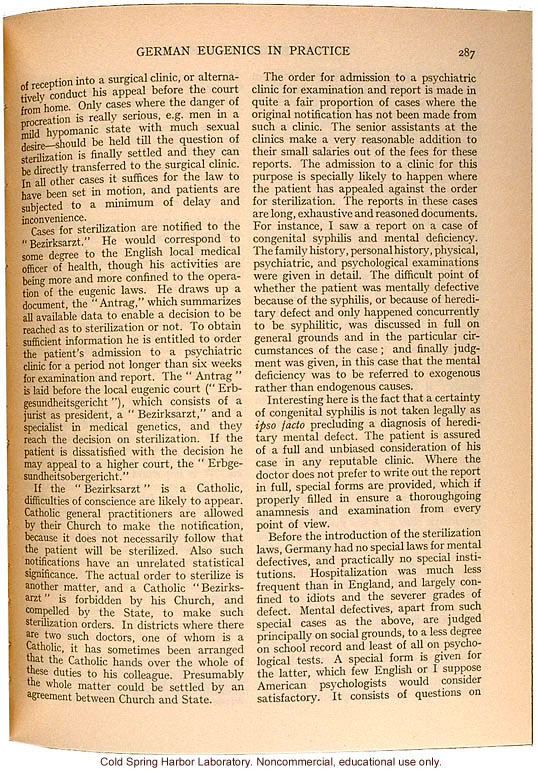"German Eugenics in Practice," by Eliot Slater, Eugenics Review (vol. 27:4), ambivalent review of sterilization and marriage laws (2)

"German Eugenics in Practice," by Eliot Slater, Eugenics Review (vol. 27:4), ambivalent review of sterilization and marriage laws (2)
1864. German Eugenics In Practice 287 of reception into a surgical clinic, or alternatively conduct his appeal before the court from home. Only cases where the danger of procreation is really serious, e.g. men in a mild hypnotic state with much sexual desire - should be held till the question of sterilization is finally settled and they can be directly transferred to the surgical clinic. In all other cases it suffices for the law to have been set in motion, and patients are subjected to a minimum of delay and inconvenience. Cases for sterilization are notified to the "Bezirksarzt." He would correspond to some degree to the English local medical officer of health, though his activities are being more and more confined to the operation of the eugenic laws. He draws up a document, the "Antrag," which summarizes all available data to enable a decision to be reached as to sterilization or not. To obtain sufficient information he is entitled to order the patient's admission to a psychiatric clinic for a period not longer than six weeks for examination and report. The "Antrag" is laid before the local eugenic court (Erbgesundheitsgericht"), which consists of a jurist as president, a "Bezirksarzt," and a specialist in medical genetics, and they reach the decision on sterilization. If the patient is dissatisfied with the decision he may appeal to a higher court, the "Erbgesundheitsobergericht." If the "Berzirsarzt" is a Catholic, difficulties of conscience are likely to appear. Catholic general practitioners are allowed by their church to make the notification, because it does not necessarily follow that the patient will be sterilized. Also such notifications have an unrelated statistical significance. The actual order to sterilize is another matter, and a Catholic "Berzirksarzt" is forbidden by his Church, and compelled by the State, to make such sterilization orders. In districts where there are two such doctors, one of whom is a Catholic, it has sometimes been arranged that the Catholic hands over the whole of these duties to his colleagues. Presumably the whole matter could be settled by an agreement between Church and State. The order for admission to a psychiatric clinic for examination and report is made in quite a fair proportion of cases where the original notification has not been made from such a clinic. The senior assistants at the clinics make a very reasonable addition to their small salaries out of the fees for these reports. The admission to the clinic for this purpose is specially likely to happen where the patient has appealed against the order for sterilization. The reports in these cases are long, exhaustive and reasoned documents. For instance, I saw a report on a case of congenital syphilis and mental deficiency. The family history, personal history, physical, psychiatric, and psychological examinations were given in detail. The difficult point of whether the patient was mentally defective because of the syphilis, of because of hereditary defect and only happened concurrently to be syphilitic, was discussed in full on general grounds and in the particular circumstances of the case; and finally judgment was given, in this case that the mental deficiency was to be referred to exogenous rather than endogenous causes. Interesting here is the fact that a certainty of congenital syphilis is not taken legally as [italics]ipso facto[end italics] precluding a diagnosis of hereditary mental defect. The patient is assured of a full and unbiased consideration of his case in any reputable clinic. Where the doctor does not prefer to write out the report in full, special forms are provided, which properly filled in ensure a thoroughgoing anamnesis and examination from every point of view. Before the introduction of sterilization laws, Germany had no special laws for mental defectives, and practically no special institutions. Hospitalization was much less frequent than in England, and largely confined to idiots and the severer grades of defect. Mental defectives, apart from such special cases as the above, are judged principally on social grounds, to a less degree on school record and least of all on psychological tests. A special form is given for the latter, which few English or I suppose American psychologists would consider satisfactory. It consists of questions on [end]
- ID: 11779
- Source: DNALC.EA


